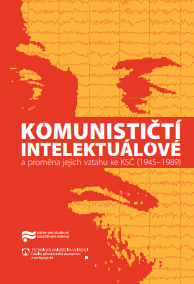Intelektuál v normalizační propagandě Proměny obrazů intelektuála a jejich didaktické využití
Intellectual in normalization propaganda - Transformation of the image of an intellectual and its didactical utilization
Author(s): Jaroslav Pinkas
Subject(s): Media studies, Political history, Social history, Recent History (1900 till today), Post-War period (1950 - 1989), History of Communism, Film / Cinema / Cinematography
Published by: Ústav pro studium totalitních režimů
Keywords: Czechoslovakia; 20th century; postwar period; media; film; normalization propaganda; intellectuals; communist party;
Summary/Abstract: First part of the text focuses on relationship between communist establishment and intellectuals. It describes two instances of intellectual involvement in a project of new society – at first in the bounds of Stalinism in the fifties, then in the bounds of the Socialism with Human Face in the second half of the sixties. Suppression of Prague spring and coming of normalization meant for most of the intellectuals ultimate break up with establishment, which projected itself in the way intellectuals were portrayed. Whereas the presentments of intellectuals in movies and later in television in the fifties and sixties granted them a decent portion of dignity, in seventies and eighties is the intellectual portrayed either as apolitical figure or as a seditious element. Intellectuals were ridiculed and lampooned, their function in society was taken over by other social groups (medicine doctors, educated engineers, party office holders, “wise men of the people”). The main focus of the second part of this text is the utilization of this topic in a classroom. Emphasis is stressed on legitimacy of this topic and its educational value (the values of intellectuals are to a large extent same as the educational objectives of the school). Specific methodical techniques are proposed, especially analyses of final portraits of intellectuals from a movie Hyppo (Hroch, director Karel Steklý) and 30 cases of major Zeman (Třicet případů majora Zemana) (episodes addressing year 1968). Possibility for comparing normalization portrayal of intellectuals with contemporary movies, for example from movie Walking Too Fast (Pouta, 2009, director Radim Špaček) is also introduced. Text also describes other possibilities for combining medial images with memories of personal observers.
Book: Komunističtí intelektuálové a proměna jejich vztahu ke KSČ (1945-1989)
- Page Range: 192-212
- Page Count: 21
- Publication Year: 2013
- Language: Czech
- Content File-PDF

